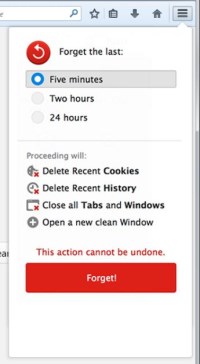Firefox celebrates 10th birthday with a 'Forget button' and a push for privacy

Today, Monday 10 November, Mozilla is celebrating the 10th anniversary of the Firefox browser with an anniversary release and a series of launches related to protecting users' privacy. These include a new Forget button, the option to use the DuckDuckGo search engine, experimental tracking protection, and the Polaris privacy initiative. The idea behind Polaris — launched with the Center for Democracy & Technology (CDT) and the Tor Project, among others — is "to bring together thought leaders in privacy," according to Gavin Sharp, senior engineering manager at Mozilla.
Mozilla also unveiled a developer edition of Firefox, customized for Web developers, and a developer preview of Firefox OS 2.0 for the Flame reference device.
As I've pointed out before, Firefox does have one significant attraction: it's the only major browser that's developed to serve users rather than the needs of a giant corporation such as Apple, Google or Microsoft. It's the only browser that you can guarantee is not spying on you for whatever purposes. It's also the only major browser that is genuinely open source (though Chromium is available as an open source version of Chrome).
Privacy could be a key advantage in a post-Snowden world where people are increasingly aware of the amount of spying done not just by America's NSA but by companies like Google. And with Firefox's market share in decline, in competition from rivals with tens of billions of dollars in their cash piles, Mozilla could certainly do with a unique selling proposition (USP).

That's what seems to be happening. In a telephone interview, Gavin Sharp and Chad Weiner said Mozilla was planning to make it easier for users to protect their privacy, and Weiner cited the "forget button" as an example. This will erase the previous five minutes, two hours or 24 hours of browsing history. I pointed out that the current version of Firefox already allows you to clear the previous one, two or four hours of history, among other things, but Weiner said "the 'forget button' makes it really quick and convenient."
Having a button that can be placed on the toolbar makes the functionality accessible to ordinary users. (But I'll stick with the old way.)
Weiner added that "we're adding DuckDuckGo as a search option, because it has a very strong and very clear privacy policy." Of course, Google will still be the default, and payments for this default are Mozilla's main source of income.
Sharp said that other changes will emerge through the "experimental" versions of Firefox. This includes tracking protection that "will block tracking on any website that does not respect Do Not Track."
Perhaps the most significant experimental development is the "multi-process architecture", which Sharp says will bring "performance and stability benefits". This is known as Electrolysis or e10s, and developers have been asked to confirm their add-ons are compatible with e10s, or report bugs, at http://arewee10syet.com/ It is expected to appear in Firefox 36 early next year.
I have mixed feelings about browsers spawning vast numbers of processes. Google's Chrome devours an insane amount of resources, which makes it generally slower than today's Firefox, much more prone to tab and Flash crashes, and unable to support as many tabs on the same PC. It's true that, with Firefox, one bad website can crash the whole browser, but with the websites I use, this doesn't happen often.
As Sharp says, "there are trade-offs." Users who care about such matters might want to look at some of the nightly builds.
Finally, for the purists, these announcements should have been made yesterday, or earlier. Firefox v1.0 was released on November 9, 2004, though millions of people were already using it, including me. The first release of the browser that was originally called Phoenix and then Firebird — to go with the Thunderbird email client — was in September 2002. Before that, of course, Firefox had its roots in the proprietary Netscape browser, which AOL, Netscape's owner, made open source.
In sum, Firefox has a long and honourable history, both in pioneering the web and as the first big success for open source. Today, after a spell of lacklustre performance, it's at least as good as Google Chrome is most respects, and frequently better. (See my earlier story, Now is the time to switch back to Firefox.)
It's not going to be easy. Firefox doesn't have the huge locked-in user bases that are exploited by Apple, Google, and Microsoft. It doesn't ship with Windows or Mac OS X, it can't use Google's Search Page for advertising, and it wouldn't use Apple's malware-style attempts to foist Safari on Windows users even if it could.
However, the organisation that, a decade ago, brought freedom of choice to a market dominated by Microsoft's Internet Explorer 6 has surely earned the chance to compete on merit. Given that, it won't do too badly.